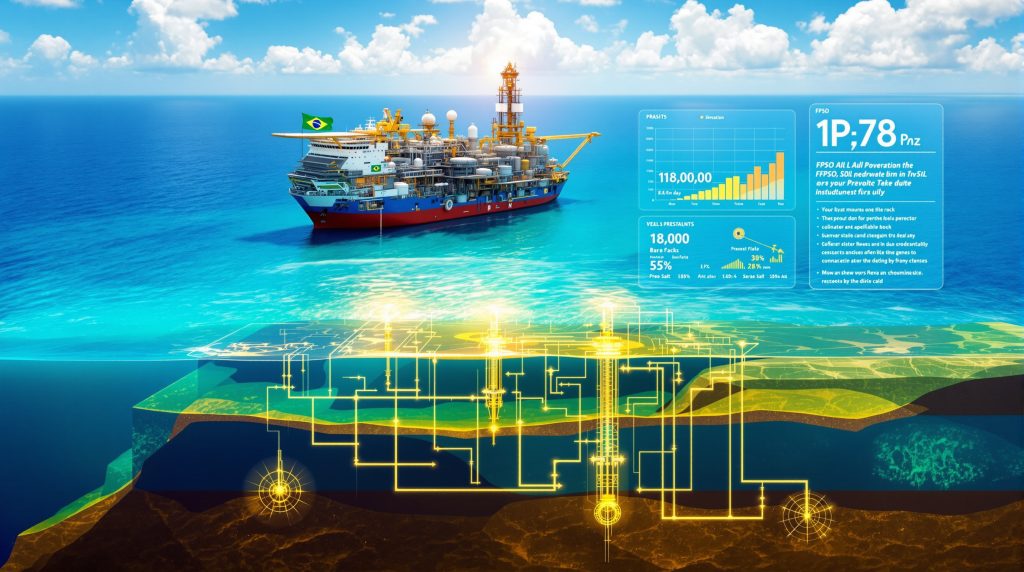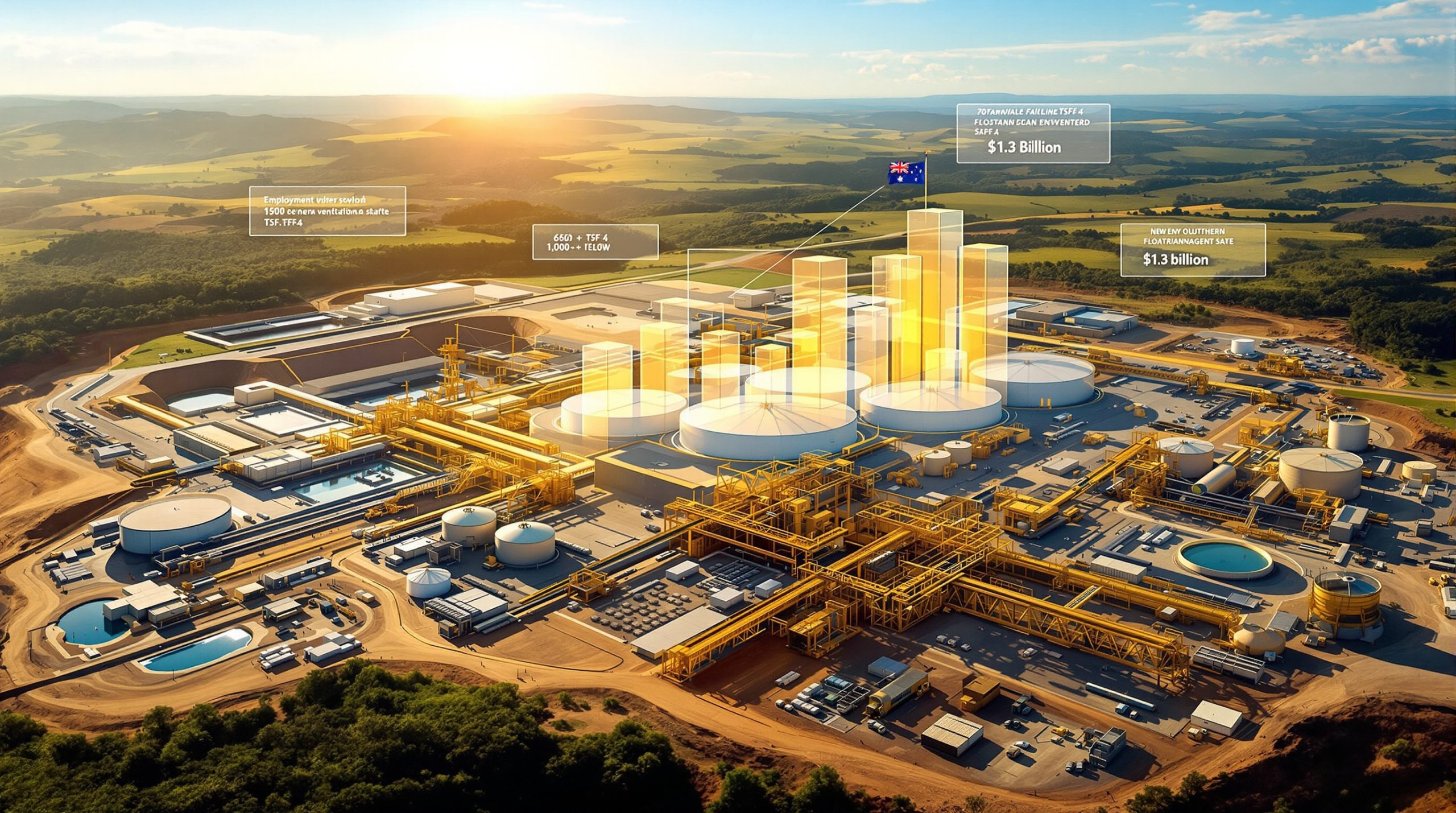Understanding Brazil's Pre-Salt Revolution
The discovery of pre-salt formations beneath Brazil's offshore waters approximately eighteen years ago transformed the nation into one of the world's most significant oil producers. These geological formations, located beneath thick layers of salt deposits in ultra-deepwater environments, represent petroleum systems with exceptional characteristics that enable production levels far exceeding initial expectations.
Brazil's strategic focus on pre-salt development has positioned the country as a leader in non-OPEC production growth. In the year preceding November 2025, Brazil increased oil production more than any other non-OPEC nation apart from the United States, demonstrating the effectiveness of its deepwater development strategy. Moreover, the recent oil price rally analysis indicates that Brazil's production capacity positions it favourably amid global market fluctuations.
The pre-salt basin's geological advantages stem from unique rock quality and natural cavity structures that facilitate cost-effective extraction in ultra-deep marine environments. These reservoirs exhibit superior porosity and permeability characteristics compared to conventional offshore formations, enabling sustained high-flow production rates that continue to exceed operator projections.
Current production from Brazilian operations reached 2.6 million barrels per day in October 2025, reflecting the cumulative impact of systematic pre-salt field development across multiple offshore concessions. This production milestone represents Brazil's emergence as a critical supplier in global energy markets, particularly for medium-heavy crude grades preferred by many refining systems. Furthermore, this growth provides a notable contrast to the US oil production decline experienced in other major producing regions.
How FPSO Technology Revolutionises Deepwater Operations
Floating Production Storage and Offloading (FPSO) systems represent the technological backbone of Brazil's deepwater oil recovery operations. These versatile platforms integrate three essential functions: processing crude oil and natural gas from subsea wells, storing refined products in hull-mounted tanks, and transferring processed oil to export vessels without operational shutdown.
The technical advantages of FPSO systems over traditional fixed platforms become particularly pronounced in ultra-deep waters exceeding 1,900 metres depth. Key operational benefits include:
• Enhanced mobility enabling repositioning for changing field conditions
• Reduced structural complexity compared to fixed steel jacket installations
• Modular capacity expansion through additional FPSO deployments
• Superior operational resilience during extreme weather events
• Lower installation risk in challenging deepwater environments
Modern FPSO units connect to subsea infrastructure through sophisticated systems including flexible risers carrying fluids from wells to processing facilities, umbilical cables providing control signals and electrical power, and subsea manifolds managing multiple well flows simultaneously. This integration enables continuous production while maintaining reservoir pressure through strategic water and gas injection.
Environmental considerations in FPSO design have evolved significantly, with latest-generation units incorporating advanced emissions reduction technologies, waste management optimisation systems, and marine ecosystem protection measures. These improvements reflect industry recognition of sustainability requirements in offshore development projects.
FPSO Technology Evolution in Brazilian Waters
Brazil's FPSO fleet represents multiple generations of technological advancement, with processing capabilities evolving from early 50,000 barrel per day units to modern installations exceeding 200,000 barrels daily capacity. This evolution reflects continuous improvement in conversion methodologies, processing efficiency, and environmental performance.
FPSO Capacity Evolution Timeline:
| Generation | Era | Typical Daily Capacity |
|---|---|---|
| First Generation | 1980s-1990s | 50,000-100,000 barrels |
| Second Generation | 2000s | 100,000-150,000 barrels |
| Third Generation | 2010s-2020s | 150,000-225,000 barrels |
| Latest Technology | 2025+ | 180,000-225,000 barrels |
The conversion process transforms Very Large Crude Carriers (VLCCs) into fully functional production platforms through extensive structural retrofitting, installation of specialised topsides processing modules, and integration of sophisticated power generation systems typically utilising gas-driven turbines.
Storage optimisation represents a critical design element for remote offshore locations. Modern FPSO units like the P-78 maintain 1.4 million barrel storage capacity, enabling 7-8 days of production inventory that buffers supply chain disruptions and optimises shuttle tanker scheduling efficiency.
P-78 FPSO: Technical Specifications and Capabilities
The Petrobras FPSO Buzios Field development showcases cutting-edge floating production technology with the P-78 FPSO representing the latest generation of processing capability. This sophisticated platform arrived in Brazilian waters during late September 2025, with first oil production targeted for December 2025. Additionally, MODEC has been instrumental in developing several FPSO units for the field, demonstrating international collaboration in this significant project.
P-78 FPSO Performance Specifications:
| Technical Parameter | Capacity | Operational Significance |
|---|---|---|
| Oil Production | 180,000 barrels per day | Ranks among largest FPSO units globally |
| Gas Processing | 12 million cubic metres daily | Supports Rota 3 pipeline integration |
| Storage Volume | 1.4 million barrels | Enables 7.8 days inventory at design capacity |
| Water Depth Operations | 1,900+ metres | Ultra-deepwater deployment capability |
| Well Connections | 16 total wells | 8 producers, 8 injectors for pressure maintenance |
The 16-well connectivity design enables optimal reservoir contact while maintaining production and injection balance critical for sustaining long-term field performance. Producer wells extract crude oil and associated gas from the reservoir, while injector wells return treated water and gas to maintain reservoir pressure and enhance recovery efficiency.
Engineering and technology leadership at Petrobras confirmed that the P-78 incorporates significant technological advances in processing efficiency and environmental impact reduction. These improvements reflect continuous innovation in FPSO design, particularly regarding emissions control and operational reliability in challenging deepwater environments.
Operational Timeline and Deployment Strategy
The P-78 deployment follows a carefully orchestrated timeline designed to minimise production disruption while integrating new capacity into existing field infrastructure. Following its late September 2025 arrival, the installation process encompasses approximately three months of commissioning activities culminating in December 2025 first oil.
FPSO Installation Phase Breakdown:
-
Arrival and Positioning (Weeks 1-2): Vessel mooring setup and pipeline connection preparation
-
Subsea Integration (Weeks 3-6): Flexible riser installation, umbilical connections, and well commissioning
-
Production Startup (Weeks 7-10): Topsides system activation and initial well connection
-
Full Capacity Achievement (Weeks 11-14): Multi-well production optimisation and export system verification
This systematic approach ensures operational continuity at the Petrobras FPSO Buzios Field, where existing FPSO units maintain production during new platform installation. The deployment strategy demonstrates sophisticated project management capabilities that have enabled consistent delivery ahead of schedule while maintaining budget discipline across multiple installations.
Búzios Field Production Performance Analysis
Búzios field serves as Brazil's primary production growth engine, contributing substantially to the country's position as a leading non-OPEC oil supplier. October 2025 production reached 2.6 million barrels per day, representing significant growth supported by capacity expansions totalling 115,000 barrels per day across existing production vessels during the third quarter of 2025.
The field's exceptional performance stems from what exploration and production leadership characterises as spectacular reservoir quality. The underlying rock formations and natural cavity structures enable production levels consistently exceeding initial geological assessments and engineering projections. Consequently, this success contrasts sharply with the challenges faced by OPEC production dynamics in maintaining market stability.
Búzios demonstrates production capabilities that surpass expectations due to superior reservoir characteristics, including rock quality and cavity formations that facilitate enhanced flow rates compared to conventional deepwater reservoirs.
Production Growth Trajectory:
| Time Period | Production Volume | Growth Driver |
|---|---|---|
| Q3 2025 Average | Baseline reference | Existing capacity optimisation |
| October 2025 | 2.6 million bpd | 115,000 bpd expansion completed |
| December 2025+ | 2.78+ million bpd projected | P-78 addition (180,000 bpd) |
The field's rapid development has established Brazil as a critical supplier in global energy markets, particularly for medium-heavy crude grades. This production growth has provided essential revenue streams supporting continued investment in exploration and development activities across Brazil's offshore portfolio.
Global Production Ranking and Strategic Significance
Búzios field's daily production volume positions it among the world's largest oil fields, competing with major international developments in terms of output and strategic importance. The field's contribution to global energy supply chains extends beyond simple volume metrics to include reliability, quality consistency, and logistical accessibility for international markets.
Brazil's production increases have outpaced most international competitors in the non-OPEC category, with growth rates exceeding all nations except the United States during the twelve months preceding November 2025. This performance reflects systematic investment in deepwater technology and operational excellence across multiple field developments.
The strategic significance of Búzios extends to energy security considerations for importing nations seeking supply diversification away from traditional OPEC sources. Brazil's stable political environment, advanced regulatory framework, and sophisticated logistics infrastructure provide additional value beyond raw production capacity. However, the potential Alaska drilling policy shift could influence future competitive dynamics in North American markets.
Pre-Salt Basin Geological Advantages
The pre-salt formations underlying the Petrobras FPSO Buzios Field exhibit geological characteristics that distinguish these reservoirs from conventional offshore developments. These petroleum systems, formed millions of years ago beneath extensive salt layers, demonstrate superior production potential due to exceptional rock quality and unique structural features.
Natural cavity structures within the pre-salt formations create reservoir conditions that facilitate higher flow rates than initially projected during field development planning. These geological advantages reduce production costs per barrel while extending field life beyond conventional reservoir expectations.
Key Geological Characteristics:
• Superior porosity enabling enhanced fluid storage capacity
• Exceptional permeability facilitating sustained high-flow production
• Natural pressure maintenance supporting long-term productivity
• Structural integrity reducing operational risk in ultra-deep environments
• Cavity formations providing additional reservoir volume beyond initial estimates
The field development strategy leverages these geological advantages through optimised well placement and enhanced recovery techniques. The combination of eight producer wells and eight injector wells maintains reservoir pressure while maximising hydrocarbon extraction efficiency across the field's productive zones.
Recovery factor optimisation represents a critical component of pre-salt development, with advanced drilling techniques and completion methods designed to access maximum reservoir contact. These technical approaches enable sustained production rates that continue exceeding initial field development projections.
Project Economics and Investment Performance
Petrobras demonstrates exceptional project management capabilities through consistent delivery of deepwater developments ahead of schedule whilst maintaining strict budget discipline. This operational excellence has enabled the company to avoid cost inflation impacts affecting many international offshore projects during recent market volatility periods.
Financial performance indicators reflect the success of Brazil's pre-salt development strategy. Third-quarter 2025 profits exceeded market expectations, driven primarily by accelerated production from field expansions and operational efficiency improvements across existing installations. Furthermore, the company's strategic positioning benefits from understanding the trade war oil market impact on global pricing dynamics.
Capital Expenditure Allocation Strategy:
| Investment Category | Percentage of Total CapEx | Strategic Focus |
|---|---|---|
| Exploration & Production | 85% | Primary growth driver |
| Refining & Marketing | 10% | Downstream optimisation |
| Infrastructure & Technology | 5% | Innovation and efficiency |
The company's financial discipline extends to investment adjustment strategies designed to accommodate oil price volatility. Whilst maintaining core development commitments, management retains flexibility to postpone certain investments during periods of reduced commodity prices, ensuring financial stability without compromising long-term growth objectives.
Revenue generation from accelerated production provides essential cash flow supporting continued exploration activities and technological advancement initiatives. This financial performance enables sustained investment in Brazil's offshore portfolio whilst maintaining competitive dividend policies for shareholders.
Cost Management and Operational Excellence
Petrobras has established industry-leading practices in cost management through systematic project execution and supply chain optimisation. Individual projects frequently achieve completion ahead of original schedules whilst adhering to approved budget parameters, demonstrating sophisticated project management capabilities.
The company's approach to cost inflation mitigation includes strategic supplier relationships, standardised equipment specifications, and operational efficiency improvements that reduce per-barrel development costs. These practices have enabled continued investment during challenging market conditions whilst maintaining profitability margins.
Budget performance across multiple FPSO installations reflects systematic improvement in project execution methodologies. This operational excellence provides competitive advantages in deepwater development, enabling faster returns on capital investment compared to industry benchmarks.
International Partnership Structure and Benefits
The Petrobras FPSO Buzios Field operates under a sophisticated ownership structure that combines Petrobras's operational expertise with strategic international partnerships. The Brazilian national oil company maintains majority control with an 88.99% ownership stake, whilst Chinese partners contribute technical expertise and financial resources through minority positions.
Ownership Distribution:
• Petrobras: 88.99% (operator and majority stakeholder)
• China National Petroleum Corporation (CNPC): 3.67%
• China National Offshore Oil Corporation (CNOOC): 7.34%
These international partnerships provide strategic benefits extending beyond simple financial investment. Chinese partners contribute advanced FPSO design expertise, deepwater drilling technology, and supply chain diversification that enhances project resilience and operational efficiency.
Technology transfer initiatives facilitate knowledge sharing in deepwater drilling techniques, environmental protection technologies, and digital monitoring systems. This collaboration accelerates innovation adoption whilst reducing development costs through shared expertise and resource optimisation. Notably, Oilprice.com reports on the continuing success of these collaborative efforts in achieving record production levels.
Supply chain diversification through international partnerships reduces dependency on single-source suppliers whilst providing access to specialised equipment and services from global markets. This strategic approach enhances project execution capabilities whilst maintaining competitive procurement advantages.
Future FPSO Expansion and Capacity Growth
Petrobras has outlined an ambitious expansion programme targeting 12 total FPSOs operating at Búzios field by 2030. This systematic capacity addition strategy represents the largest deepwater development programme in the Southern Hemisphere, establishing new industry standards for offshore production efficiency.
The planned fleet expansion includes next-generation technology platforms incorporating advanced environmental systems and enhanced processing capabilities. FPSO Almirante Tamandaré, scheduled for deployment with 225,000 barrels per day capacity, will represent the largest production vessel in Brazilian waters upon installation.
Expansion Timeline and Capacity Additions:
• P-78 FPSO: 180,000 bpd (December 2025 first oil)
• FPSO Almirante Tamandaré: 225,000 bpd (largest in Brazil)
• P-91 FPSO: Contracting process underway
• Additional units: Progressive deployment through 2030
Cumulative production capacity from the complete 12-FPSO fleet will exceed 2.4 million barrels per day from Búzios field alone, representing approximately 90% of Brazil's current total oil production from a single field development. This capacity concentration demonstrates the exceptional productivity potential of pre-salt reservoirs.
Next-Generation Technology Integration
Future FPSO installations will incorporate cutting-edge technology designed to minimise environmental impact whilst maximising production efficiency. Carbon capture systems, reduced emissions platform designs, and enhanced gas export capabilities represent key technological advances planned for upcoming deployments.
Digital monitoring and automation systems will enable remote operation capabilities and predictive maintenance programmes that reduce operational costs whilst improving safety performance. These technological improvements reflect industry evolution toward sustainable production practices and operational excellence.
Gas export enhancement through Rota 3 pipeline integration will capture additional value from associated gas production whilst reducing flaring emissions. This infrastructure development supports Brazil's commitment to environmental responsibility in offshore operations.
Environmental Considerations and Sustainability Initiatives
Modern FPSO design incorporates comprehensive environmental protection measures reflecting industry recognition of sustainability requirements in offshore development. Latest-generation platforms implement low-carbon design principles, emissions reduction technologies, and waste management optimisation systems.
Environmental Technology Implementation:
• Carbon capture systems for emissions reduction
• Gas flaring minimisation through enhanced processing
• Advanced waste management and treatment systems
• Marine ecosystem protection protocols
• Continuous environmental monitoring capabilities
Regulatory compliance extends beyond Brazilian environmental standards to include international maritime safety requirements and stakeholder engagement protocols. This comprehensive approach ensures operational approval whilst maintaining community and environmental stewardship responsibilities.
Emissions reduction represents a critical focus area for future developments, with next-generation FPSOs designed to achieve significantly lower carbon intensity compared to existing installations. These improvements align with global energy transition objectives whilst maintaining production efficiency.
Strategic Impact on Global Energy Markets
Búzios field development represents more than a single production project; it exemplifies Brazil's emergence as a critical non-OPEC energy supplier capable of influencing global market dynamics. The field's exceptional production capacity and continued expansion provide supply stability during periods of international market volatility.
Brazil's deepwater production growth contributes to global energy security by diversifying supply sources away from traditional OPEC producers. This geographic and political diversification provides importing nations with additional supply options that enhance energy independence strategies.
The field's medium-heavy crude production characteristics serve specific refinery requirements in international markets, particularly in Asia and North America. This product specification provides Brazil with competitive advantages in crude oil marketing whilst supporting premium pricing for produced volumes.
Disclaimer: Production forecasts, capacity projections, and market impact assessments involve inherent uncertainties related to geological conditions, technological performance, and global market dynamics. Actual results may vary significantly from projected outcomes due to operational challenges, regulatory changes, or unforeseen technical issues.
Future market influence will depend on successful execution of the 12-FPSO expansion programme and continued geological performance meeting or exceeding current production expectations. Brazil's position as a leading deepwater producer provides strategic leverage in global energy supply negotiations whilst supporting domestic economic development objectives through sustained petroleum revenue generation.
Looking to Capitalise on Major Energy Discoveries?
Discovery Alert's proprietary Discovery IQ model instantly alerts investors to significant ASX mineral discoveries, providing the same competitive edge that major developments like Brazil's pre-salt revolution demonstrate in global energy markets. Explore how major mineral discoveries can generate substantial returns and begin your 30-day free trial today to position yourself ahead of the next breakthrough.




